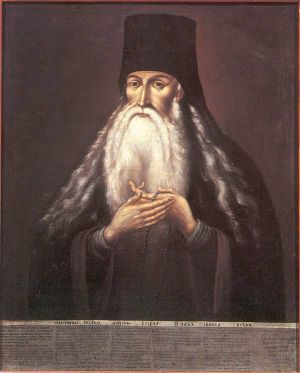Difference between revisions of "Paisius Velichkovsky"
| Line 7: | Line 7: | ||
Paisius wrote theological epistles to his disciples and translated into Russian a great number of Greek theological writings, including selections from the [[Philokalia]]. He exerted immense influence on the startsy of the Optina [[Monastery]] both through his translations and through his personal disciples, such as Admiral Saint [[Theodore Ushakov]]. | Paisius wrote theological epistles to his disciples and translated into Russian a great number of Greek theological writings, including selections from the [[Philokalia]]. He exerted immense influence on the startsy of the Optina [[Monastery]] both through his translations and through his personal disciples, such as Admiral Saint [[Theodore Ushakov]]. | ||
| − | == | + | ==Quotes== |
| − | + | "The enemy likes to hide the truth and to mix good with evil. But how can one find out the truth? God's goodwill and all our intentions are meek, full of good hope, and undoubting. Not only in our good deeds, but also in our lawlessness, God endures long with meekness and awaits our repentance. And how can one distinguish the impulse of the enemy? The enemy usually hinders us and turns us away from good. However, if in anything which apparently is good, the mind is disturbed and causes us disturbance, banishes the fear of God, deprives us of calmness, so that without any reason the heart aches and the mind wavers, then know that this is an impulse from the enemy and cut it off." | |
| + | |||
| + | "Remember, O my soul, the terrible and frightful wonder: that your Creator for your sake became Man, and deigned to suffer for the sake of your salvation. His angels tremble, the Cherubim are terrified, the Seraphim are in fear, and all the heavenly powers ceaselessly give praise; and you, unfortunate soul, remain in laziness. At least from this time forth arise and do not put off, my beloved soul, holy repentence, contrition of heart and penance for your sins." | ||
==Sources and further details== | ==Sources and further details== | ||
Revision as of 04:48, May 13, 2006
A Ukrainian by birth, Peter Velichkovsky was born in Poltava, where his father Ivan was a priest. At the age of 17 he took monastic vows and went to Mount Athos, where he established a separate hermitage for himself and his followers.
In 1764 Prince Ghika of Moldova asked Paisius to revive the monastic life in his country. Thereupon Paisius and 64 other monks went to Jassy. While living in Moldova, Paisius administrated several cloisters, notably the one at Neamt.
Paisius wrote theological epistles to his disciples and translated into Russian a great number of Greek theological writings, including selections from the Philokalia. He exerted immense influence on the startsy of the Optina Monastery both through his translations and through his personal disciples, such as Admiral Saint Theodore Ushakov.
Quotes
"The enemy likes to hide the truth and to mix good with evil. But how can one find out the truth? God's goodwill and all our intentions are meek, full of good hope, and undoubting. Not only in our good deeds, but also in our lawlessness, God endures long with meekness and awaits our repentance. And how can one distinguish the impulse of the enemy? The enemy usually hinders us and turns us away from good. However, if in anything which apparently is good, the mind is disturbed and causes us disturbance, banishes the fear of God, deprives us of calmness, so that without any reason the heart aches and the mind wavers, then know that this is an impulse from the enemy and cut it off."
"Remember, O my soul, the terrible and frightful wonder: that your Creator for your sake became Man, and deigned to suffer for the sake of your salvation. His angels tremble, the Cherubim are terrified, the Seraphim are in fear, and all the heavenly powers ceaselessly give praise; and you, unfortunate soul, remain in laziness. At least from this time forth arise and do not put off, my beloved soul, holy repentence, contrition of heart and penance for your sins."
Sources and further details
Categories > Church History
Categories > Church History
Categories > Church History
Categories > Church History
Categories > Church History
Categories > Liturgics > Feasts
Categories > Liturgics > Feasts
Categories > Liturgics > Feasts
Categories > Liturgics > Feasts
Categories > Liturgics > Feasts
Categories > Liturgics > Prayers
Categories > OrthodoxWiki > Articles in a series > Orthodox spirituality series
Categories > People > Monastics
Categories > People > Monastics
Categories > People > Monastics > Athonite Fathers
Categories > People > Saints
Categories > People > Saints > Romanian Saints
Categories > People > Saints > Russian Saints
Categories > People > Saints > Saints by century > 18th-century saints
Categories > People > Saints > Ukrainian Saints
Categories > Spirituality > Asceticism
Categories > Spirituality > Asceticism
Categories > Theology > Hesychasm
